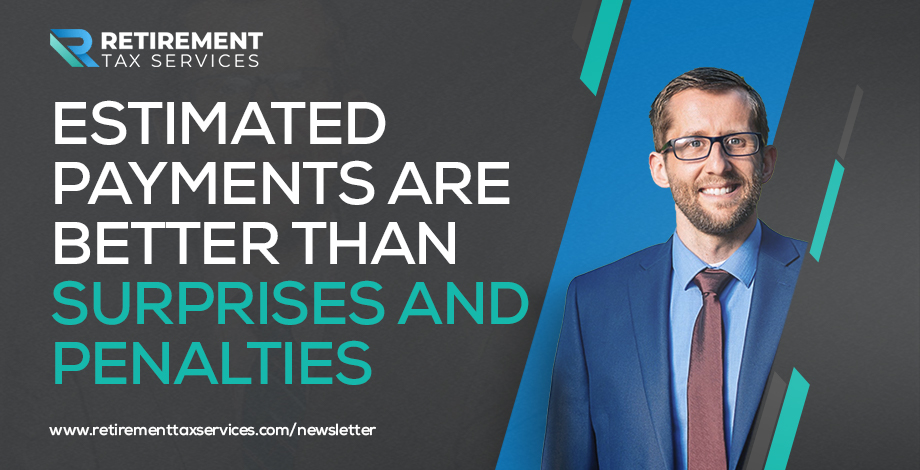
RTS #008 – Estimated payments are better than surprises and penalties
The basics may sound boring, but they can make a HUGE difference. Here is an example of what people are up against if they don’t have someone in their corner looking out for their taxes beyond simply filing a tax return each year.
“Talked with a client today; a CPA recommended they not do any estimated tax payments as it’s ‘not worth the hassle’. The client is self-employed and will owe over $50,000 in federal income tax along with close to $20,000 in self-employment tax.”
That “hassle” could cost the client thousands of dollars in penalties and interest, which is a terrible way to tip the IRS. Penalties like this often come as a surprise to the taxpayer because they think of their taxes and taxable income as being for the entire year, which is not the way the IRS sees it. The IRS evaluates your tax liability on a quarterly basis and expects that you will make tax payments as you go.
The IRS’s estimated payment deadlines don’t perfectly line up with the quarters, but these are also the dates they use to calculate how much interest they are going to charge a taxpayer who is not making payments as they go. Here are the remaining deadlines for 2023 and the deadlines for 2024:
- Q3 2023 – September 15, 2023
- Q4 2023 – January 15, 2024 (this one gets people because they assume they can wait until the filing deadline)
- Q1 2024 – April 15, 2024
- Q2 2024 – June 17, 2024
- Q3 2024 – September 16, 2024
- Q4 2024 – January 15, 2025
Taxes are very emotional for people. I regularly work with wealthy taxpayers who get angry if they owe $10 in penalties, let alone the thousands that this taxpayer would be on the hook for if their Advisor hadn’t identified this issue and stepped in.
The IRS does give favorable treatment to tax withholdings over estimated payments. Estimated payments are treated as received when the payment is made, but withholdings are treated as received evenly throughout the year regardless of when they are received. This means that having a large amount of taxes withheld in December from a bonus check or IRA withdrawal would be treated as received partially in each quarter and can help avoid underpayment penalties.
To ensure that payments are made timely and applied to the correct year, we always encourage our clients to make payments online. The IRS’s payment portal is relatively easy to use, and a great value add is creating a step-by-step guide for clients with screenshots of the IRS’s website to make this really easy for them (an RTS branded guide is available in the members’ section).
Even if the safe harbor rules apply and a client can wait until the end of the year to make large tax payments, this can still create issues from a behavioral standpoint. If they get to the end of the year and don’t have $70,000 of cash available or misremembered the amount or had an unexpectedly good year, and it’s actually $90,000 or $100,000, these all create the potential for very difficult conversations and painful checks.
What can you do about it?
Making sure clients are not getting hit with penalties should definitely be on your tax return review checklist; It’s on ours. This also means that you need to be getting and reviewing tax returns for all of your clients every single year. “What is your strategy for paying the taxes on _______” fill in the source of income and make sure you are having this conversation with clients to help them be intentional and avoid penalties and surprises.
Happy Tax Planning!